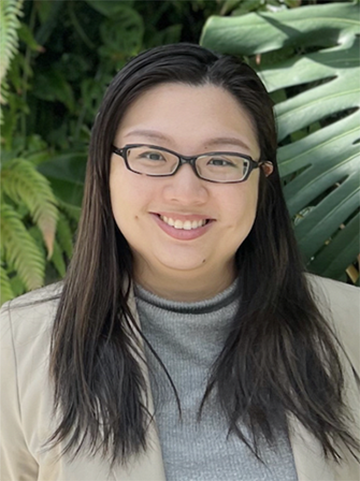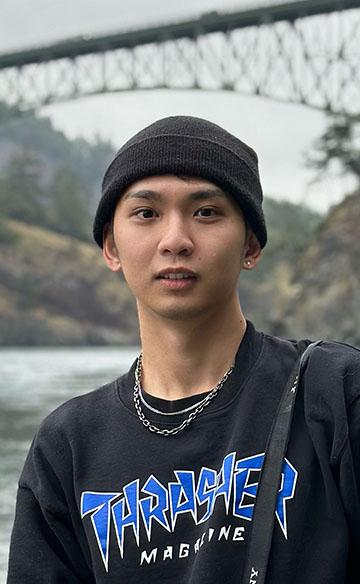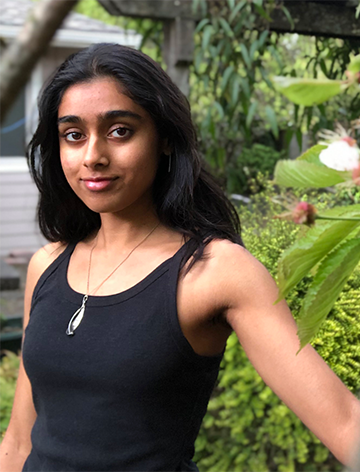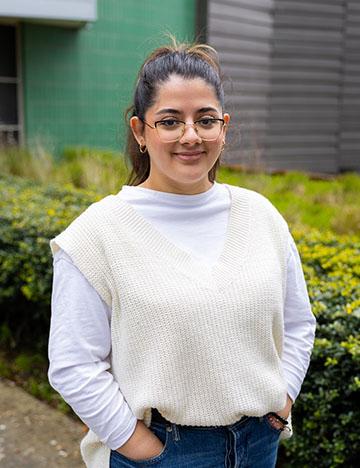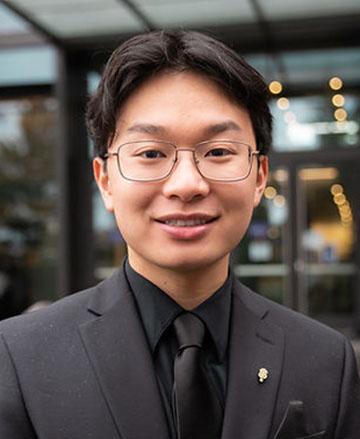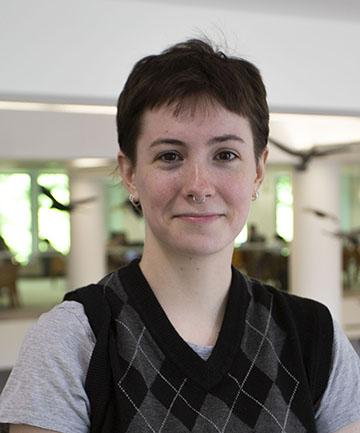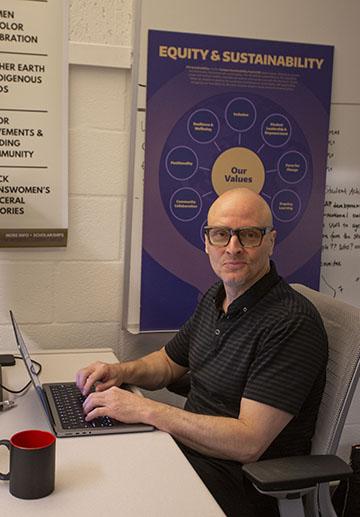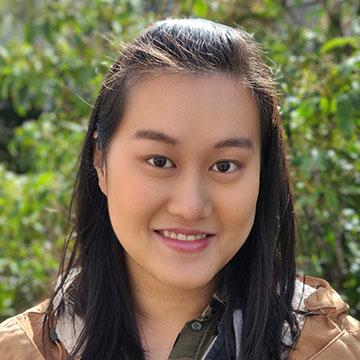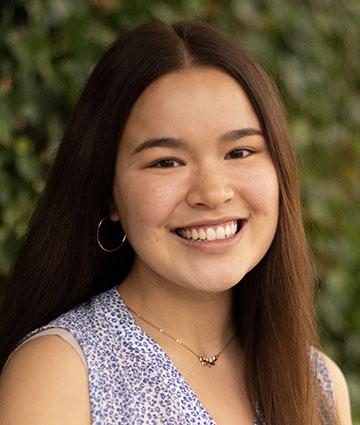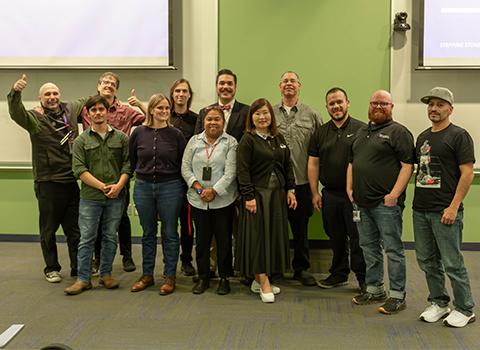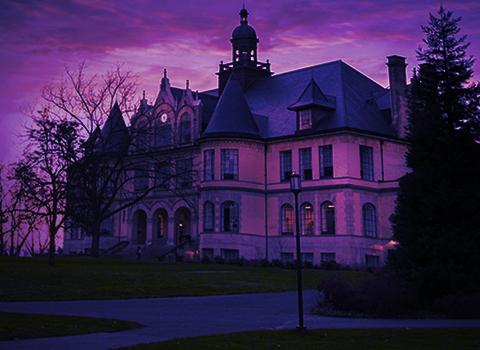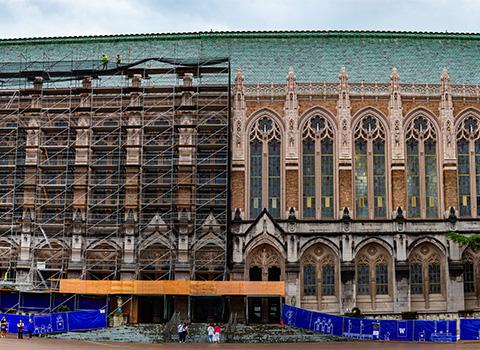Interns get ready for real world
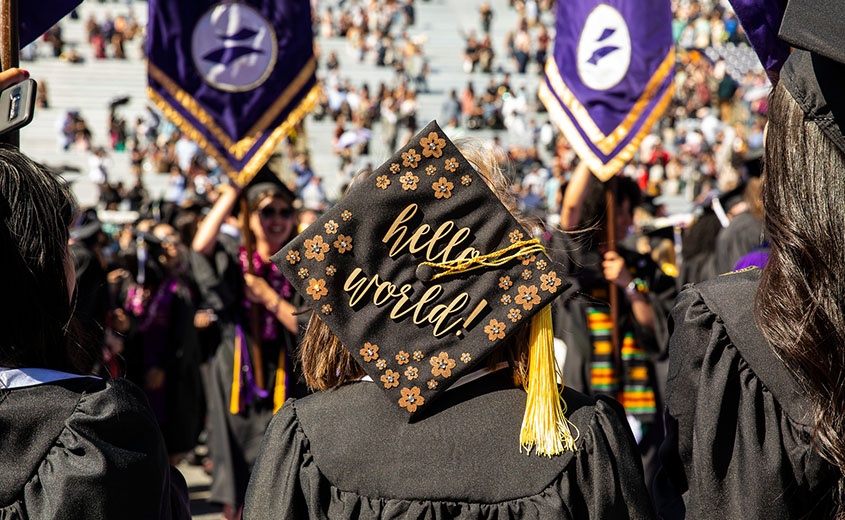
Eleven UW Facilities interns will receive undergraduate or graduate degrees at UW Commencement on June 10.
Internships take education beyond book learning to hands-on learning. Students get to put a skill or knowledge into practice ahead of their career journey — experience especially valuable for the UW Facilities interns who are graduating this year.
Some of these 2022-23 interns shared how their time at UWF helped prepare them for life after college. All interviews have been edited for length and clarity.
Vivien Chim
Where they interned: Real Estate
Tell me about yourself. Where are you from?
I’m from Taiwan and Singapore. I moved to the U.S. about 7 years ago as a UW undergrad.
What do you study, and what are you interested in doing for your career?
I'm currently a master’s of science in real estate student, and I'll be graduating this June. I actually just signed an offer. It's an internship on the asset management team with Unico Properties.
What do you do in your internship?
I worked on some high impact projects, and I'm really thankful for the opportunity that Jeanette [Henderson] and the office have been willing to give me. I was really lucky that I touched on everything. For example, annually we assemble an asset management budget plan where we compile all the rent we collected and see if we broke even or had a loss. If we have extra, we put it into our reserves and plan for capital improvements. So I help compile the information and also report on the budget plan to the VP of Facilities.
I was also able to compile information about the U District. There's a lot of exciting development happening in our neighborhood since the 2018 zoning code change that allows us to build higher. I spoke with members of the UW Board of Regents who have a special interest in real estate and reported some of our findings. With that one, I took the opportunity to advocate for the student community and tell them the U District is not affordable, even with all this development.
What's been your favorite part of the internship?
Working with different people on all these projects, especially people within my office. I feel a lot more confident and comfortable collaborating and working with different people, which are really good skills to have in my industry. There are such big projects. You have to be able to collaborate with different people to push things through and create something high impact.
How has your internship prepared you for what's next?
This internship really contributed so much to my learning and my growth as a real estate professional. In my real estate law class, they were talking about contracts and agreements, and I'm just like, “Yeah, that's my job every day — reading through the things and interpreting them.”
It's a tough market this year to job hunt. The commercial real estate market is not doing great when the economy is in a down cycle, so I am already far ahead. Before graduation I can comfortably say, “Hey, I do have an offer that I'm comfortable signing.” It wouldn't have happened without the experience and the training that I gained through this internship.
J.B. Huang
Where they interned: Engineering Services
Tell me about yourself. Where are you from?
I'm originally from China and I've been living in Seattle for a little bit past eight years. I went to a local high school, I’m getting my undergrad degree this June, and then I’m getting my master’s degree.
What do you study, and what are you interested in doing for your career?
I am studying applied and computational mathematics. We deal with how to analyze problems and then view a model for a possible solution. In the future, I want to do something related to problem-solving from the data perspective.
What do you do in your internship?
So in our group, Jecca [Canet] handles a lot of data about greenhouse emissions and all the utility bills. Most of the data from the facility provider is in a raw template and not in the template we want. My job is to write an algorithm to transfer them into the specific format that our group wants.
We work with UW Sustainability, and sometimes they want their data to be visualized. Part of my job is to use a visualization tool so that people can see a pie chart or something where you can see a percentage of which area is consuming or costs the most. And then you can do further investigations on that data.
What's been your favorite part of the internship?
Learning about environmental regulations. Sometimes Jecca and I go into the Power Plant, and we go into a boiler to collect the data. We also sometimes fly a drone to do inspections. I get to put my hands on physical things. I can go into all kinds of facilities to learn how greenhouse emissions can sometimes affect the ecological environment.
How has your internship prepared you for what's next?
I practice my problem-solving skills. Most of the team doesn't usually do coding, so I have to develop my own ideas and pass these ideas by Jecca, sometimes by Robbie [Avila], and then we all discuss the solutions to see if this is something they want.
Jecca gets me to practice my soft skills, too. I use the Engineering Services email to respond to utility providers or other people who have questions for our team. She also wants me to write development notes, which is just like a user guide. Every time I complete a coding project, she wants me to go to every part of the code and tell how to use it, how to maintain it and also troubleshooting. It involves a lot of logical thinking, logical mapping. It’s not something I do every day.
Radha Iyer
Where they interned: UW Sustainability
Tell me about yourself. Where are you from?
I've been in the Seattle area all my life, so this is very much home to me. I grew up in Bellevue, and I still live in Bellevue, which is great.
What do you study, and what are you interested in doing for your career?
I have two majors. The first is architecture, and the second is math. Most of my work with Sustainability is more related to the architecture side of things. But in the future, I plan on tying more into the computational stuff.
I plan on going into professional practice as an architect. I also really enjoy teaching. At some point I'd like to be something a little more like my instructors and teach, whether at a university or a school.
What do you do in your internship?
I'm working on generating a report and some policy around embodied carbon in buildings. Right now, UW doesn’t have a very extensive set of green building standards, which are what we require of architects and firms if they are building anything on campus. What we're trying to do right now is upgrade our current standards to something a little bit more cognizant of embodied carbon, so not only carbon emitted by the building, like electricity and natural gas, but also in the building materials themselves. I'm researching the products used to make buildings and how we can measure and regulate carbon within them.
What's been your favorite part of the internship?
The people around me. I'm in the same office as the Campus Sustainability Fund and Lisa [Dulude] and some people from the Carbon Leadership Forum. So, it's been really nice just being in that same space in the real world especially since we’re fresh out of the pandemic.
How has your internship prepared you for what's next?
It's given me an eye into a bunch of different aspects of design in general that I didn't really know about. I've been able to see a little bit of the facility side, a bit of the project delivery side, definitely a bit more of the architecture side, too. I’ve just gotten to kind of experience more bits of the industry than I ever thought I’d be able to.
Carolina Lopez
Where they worked: Building Services Department
Tell me about yourself.
I’m currently a student at the Foster School of Business, set to graduate this June. I'm majoring in HR with a minor in Education. I am Mexican and first-generation. I take pride in my culture and background. Throughout my undergrad, I have participated in various programs aimed to support underrepresented students. I believe in giving back to communities and try to do so in any capacity I can.
What are you interested in doing for your career?
I'm interested in HR or consulting. I would love a role where I am encouraged to grow, learn and get out of my comfort zone.
What do you do in your internship?
I help with marketing and recruitment for the Building Services Department. I mostly focus on utilizing Canva to create designs for informational purposes, events, or outreach. One of my favorite projects was when I worked with Sarah [Lewis-Assink] on the curriculum for UWF's Stepping Stones leadership development program. Throughout the year, I have had the privilege of working on a variety of projects, which has allowed me to broaden and strengthen my skill set.
What's been your favorite part of the internship?
Learning more about the custodians at UW. I gained a lot of insight on the stigma that comes with being a custodian. Before this role, I never really had the chance to connect with custodians to hear their backgrounds or stories. It gave me a better perspective and encouraged me to have more open conversations advocating against the discrimination.
How has your internship prepared you for what's next?
Amanda [Dassoff] is honestly the best manager I've had. She's clear with my tasks and then gives me the freedom to be creative. Afterwards, she provides both positive and constructive feedback, which I really appreciate. She’s very engaging and hands on. She taught me a lot about what type of management style I like and prefer. Moving forward, that is something I know to look for in future managers.
Timon Nguyen
Where they worked: Finance & Administration
Tell me about yourself. Where are you from?
I'm from Lynwood. I've been drawn to UW all my life. It was my mom and the way she talked about her time at UW and her education and being able to raise me and my family because of her education.
What do you study, and what are you interested in doing for your career?
I'm studying business, specifically majoring in finance and information systems. I've been looking for analyst positions on very collaborative teams essentially, but someday I actually hope to be a supervisor like my supervisor [Chiaka Amadi] or some sort of manager, just so that I could facilitate an environment just as he did.
What do you do in your internship?
I do budget reconciliation and procurement and ensure accurate invoice processing. And then I work closely with my department, especially my supervisor, to ensure data integrity and financial integrity. I think I get a lot of a lot of passion out of it, just because I know that the work that I do alleviates the work and stress on the department.
What's been your favorite part of the internship?
I love my supervisor Chiaka. He is always communicative, always checking in. I remember being onboarded as an intern — it was my first internship in finance — and he made the entire experience seamless and so comfortable and made me feel like it was okay for me to make mistakes. Because of that, I was learning so much, because I was given that space to learn from my mistakes. He also showed me what the best work environment was, which was just an environment where you're not just co-workers, but you’re comfortable with one another.
How has your internship prepared you for what's next?
I have a full time offer at Morgan Stanley postgrad, and I would not have been able to get that without being able to speak about my experience with UW Facilities. In the multitude of interviews I've had, I was always immediately going to my experience with UW Facilities not only because of the technical experience I got, but also the general experience I got from working with people and soft skills as well. I think I definitely just wouldn't be the person I am professionally as well as personally without this experience.
Andrea St. Martin
Where they worked: Campus Architecture & Planning
Tell me about yourself. Where are you from?
I grew up in Blaine, Washington and I have been in Seattle since 2020. I have always been a creative person and enjoy making art and visiting museums and art shows. As someone who has lived in Western Washington, I have grown to love exploring within the city or the nearby outdoors.
What do you study, and what are you interested in doing for your career?
I am an undergraduate majoring in architecture with a focus on history and theory. I am interested in working as an architect in the long run. I am especially interested in affordable housing, building accessibility and sustainability.
What do you do in your internship?
I am a space manager intern at Campus Architecture & Planning. I work on a wide range of projects from data entry collected on building walkthroughs to art inventory of ArtsWA artwork on campus. My work often alternates between walking around campus collecting information about buildings or artwork on campus and then entering the data collected. I am also part of an art committee with ArtsWA that meets to select an artist for a new building that will be built on campus.
What's been your favorite part of the internship?
I have enjoyed getting to know UW's campus more, like south campus, which is really quite beautiful. I have learned so much about the little things that go into maintaining order on such a large campus. Before this I didn't really notice how much art was there. And now I notice a lot more — or I'm able to point out art on campus that a lot of people walk past and don’t notice.
How has your internship prepared you for what's next?
I think that working on a large variety of projects has helped me learn how to be adaptable. As I figure out what's next, I am excited to continue to learn and to accept whatever opportunities come my way.
Bonus question: What’s your favorite piece of art?
I don't know if it's my favorite, but there’s one called Abyssal Storm. It’s in the Ocean Sciences building, and you can rotate it and there's sand in it. I think it's really pretty. I also really like how it's interactive.
Christoph Strouse
Where they worked: UW Sustainability
Tell me about yourself. Where are you from?
I'm a Seattle native. I returned to school as an adult, got involved in sustainability at community college, worked at the sustainability office there and worked on their first solar project.
What do you study, and what are you interested in doing for your career?
I ended up deciding to come to the University to study urban planning and then to come back and do my master’s degree in urban planning.
I'm interested in sustainable equitable climate planning either at the institutional level — so an organization like the university or a corporation — or at the city or regional levels — so working for city or county. I'm really interested in how to create system change through all the different areas of sustainability and really centering social equity outcomes so it's not just about things, it's about people.
What do you do in your internship?
I've been working on our carbon roadmap, which is a really new strategy document for us to look at what we are doing now with our five-year sustainability action plan — how can that get us to our 2030 carbon reduction goals, our 2040 goals and then to get to net zero by 2050.
Right now we're conducting a new greenhouse gas inventory. This will be our first greenhouse gas inventory that is a consumption-based inventory. So it's looking at all the products that we purchase and bring to campus. You know, can this be recycled? Let's start looking at our supply chain. That's a huge complex category, because that's working with vendors and suppliers.
What's been your favorite part of the internship?
I think my favorite part is being able to actively participate in changing the campus and making the campus more sustainable. None of this happens with just one unit doing it. It's really a team effort, and it requires all the different units across the University to take some ownership and pride in what we can do. It's been an incredible learning experience, but it's also been really inspiring to see that you can affect change as an individual if you're positioned within an organization that is actively seeking to create transformation.
How has your internship prepared you for what's next?
Understanding how complex projects get managed over time, understanding how to bring stakeholders together to achieve goals and targets over a period of time — that’s clearly transferable to just about anything one would do in the professional world. And then just that bigger picture of understanding institutional change and that change is slow, but it happens. That gives me both a sense of hope and a sense of purpose and direction in terms of what I want to do in my career.
Amber Wu
Where they worked: Engineering Services
Tell me about yourself. Where are you from?
I'm in the MS in architecture and design technology program. And I also did undergrad here in the architecture program. I'm originally from Singapore.
What are you interested in doing for your career?
I'm interested in BIM, building information modeling, which is asset information management related to architecture projects. So a non-BIM 3D model is just simply geometries. With BIM, the 3D models contain information. For example, with a wall, it could contain material information, square footage, which room it's assigned to, cost and more. It's also a collaboration tool between disciplines.
What do you do in your internship?
Architect and engineering firms have different ways of doing their model and presenting their information to UW. So we wanted to standardize that. What I did was create this template architects can apply to their submissions so that it will send whatever information we need. I also made an export setting that allows you to export drawings to the format the folks doing archiving need it to be. They may normally need to do clean up here and there, but the setting means a lot less clean up and saves a lot of time for them.
What's been your favorite part of the internship?
I really like that it was pretty flexible and taught me how to problem solve. And I got to learn how to use Dynamo, a visual scripting tool that works with Revit, the BIM software we use. There was not a huge rush to get things done, so I got to really learn how to do it and get it working some. Some things take a while to get it to work — and lots of Googling — but when it finally did work and they could automate things, it was really satisfying.
How has your internship prepared you for what's next?
Definitely knowing more about BIM, which is already this hot topic in the architecture and construction industry because of how much it can help with workflow. And it's also partially why I wanted to embark on this as a career path. And this internship helped me learn BIM on the owner side of things. BIM can be really different, depending on which discipline you're in. I think it was really useful knowing what the owner side of things looks like with BIM and learning how UW implements their standards for design.
Gulsima Young
Where they worked: UW Sustainability
Tell me about yourself. Where are you from?
I’m from Kazakhstan, and I grew up in Pullman, Washington. I’m interested in the connection between environmental justice and policy, and how we can use policy to initiate change and collaboratively address how our systems are creating barriers that perpetuate patterns of injustice.
What do you study, and what are you interested in doing for your career?
I'm studying Informatics and Environmental Studies, and the combination of these two majors have really guided my role with the Campus Sustainability Fund. I am starting graduate school at Brown University in June. It's a public policy-focused degree, and I hope to explore environmental justice and learn about other realms of policy, because everything is so interconnected.
What do you do in your internship?
As the Project Development Specialist at the CSF, I'm the point of contact for all of our currently funded projects, as well as our projects that are in the application process. Once projects are approved, I check in with them periodically and make sure that they have the support they need. I also manage the quarterly project reporting process. One effort that we've been focusing on is exploring how we can expand the definition of sustainability beyond the traditional narrative of environmentalism because it's very exclusionary. We're looking at how we can support a broader, more intersectional range of initiatives in areas such as social sustainability, equity, community building and cultural resilience on campus and beyond.
What's been your favorite part of the internship?
It has been really cool to see all of the student projects. We have over 50 active projects right now that approach sustainability from a multitude of perspectives and range from a couple hundred to hundreds of thousands of dollars. It has taught me that students are highly capable of driving change on campuses and in communities. Some of the most radical change throughout UW’s history has been led by students.
How has your internship prepared you for what's next?
The best part of working at the CSF has been the people I work with — Tatiana Brown, Kort Maeda, and Kyle McDermott. I have learned so much from them and they have all made such meaningful contributions to the UW community. Through our work together, I have grown to understand how interconnected everything is and how essential it is to engage with and support intersectional, justice-centered sustainability initiatives. I’ve been equipped with a whole new perspective and whole new set of skills that have taught me a lot. I have been really grateful for the opportunity.
